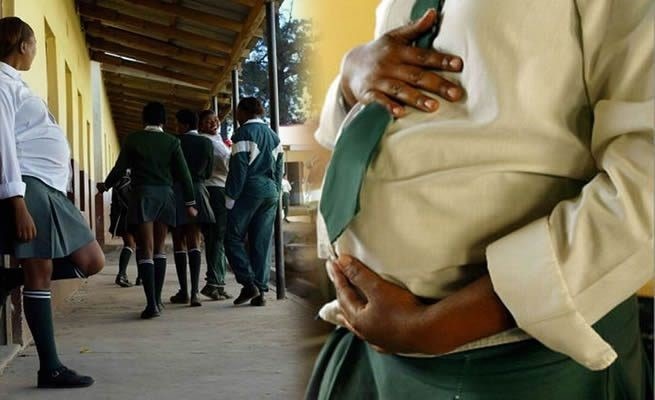Teenage pregnancy is a complex and sensitive issue that affects millions of young people worldwide. In Nigeria, it’s a growing concern that requires attention and action. According to the Nigerian Demographic and Health Survey (2018), teenage pregnancy accounts for 23% of all births in the country.
According to the World Health Organization (WHO), Nigeria has one of the highest rates of teenage pregnancy in the world. An estimated 22% of girls between the ages of 15 and 19 are already mothers or pregnant with their first child. This staggering statistic is a clear indication that something is amiss in our society.
Join our WhatsApp ChannelPoverty, lack of education, and cultural norms that perpetuate gender inequality are just a few of the factors that contribute to the high rate of teenage pregnancy in Nigeria. In many cases, young girls are forced into early marriage, and subsequently, early motherhood. This not only puts their health at risk but also limits their opportunities for education and economic empowerment.
Moreover, the stigma surrounding teenage pregnancy in Nigeria is so severe that many young girls are forced to hide their pregnancies, resorting to unsafe abortions or giving birth in secret. This silence and shame only serve to perpetuate the cycle of teenage pregnancy, as young people are denied access to the information and resources they need to make informed choices about their sexual health.
Teenage parents in Nigeria often face social stigma and rejection from family, friends, and community members. This can lead to feelings of shame, guilt, and isolation, making it difficult for them to access support and resources. Blessing, a 22-year-old mother, shares her experience: “I was 16 when I got pregnant. My parents were disappointed, and I felt ashamed. But with support from my baby’s father and family, I completed my education and became a nurse.” Blessing’s story highlights the importance of support and acceptance in helping teenage parents overcome challenges.
Teenage pregnancy can disrupt education, limiting future opportunities and potential. According to the United Nations Educational, Scientific and Cultural Organization (UNESCO), teenage pregnancy is a leading cause of school dropout among girls in Nigeria. Chinelo, a 20-year-old mother, shares her experience: “I was raped at 15 and became pregnant. It was a difficult journey, but I found strength in counseling and support groups. I had to drop out of school, but I’m now pursuing my education through a correspondence program.” Chinelo’s story emphasizes the need for alternative education options and support systems for teenage parents.
Raising a child as a teenager can be financially overwhelming. Teenage parents often rely on their families or partners for financial support, which can lead to dependence and limit their autonomy. According to Dr. Olufunmilayo, an adolescent health specialist, “Teenage pregnancy is a public health concern that requires comprehensive solutions, including access to education, healthcare, and social support.” Dr. Olufunmilayo’s view highlights the need for a multifaceted approach to address the challenges faced by teenage parents.
Teenage parents may experience anxiety, depression, and emotional distress due to the pressures of parenthood and societal expectations. According to Mrs. Adesina, a social worker, “We need to address the root causes of teenage pregnancy, such as poverty, lack of education, and gender inequality.” Mrs. Adesina’s view emphasizes the need to address the underlying factors contributing to teenage pregnancy.
Nneoma, a 25-year-old mother, shares her story: “I was 17 when I got pregnant. My parents were supportive, and I continued my education. Now, I’m a university student, and my child is in primary school.” Chidinma, a 22-year-old mother, shares her experience: “I was 16 when I became pregnant. I felt lost and alone, but counseling and support groups helped me through the journey.”
Experts in the field of adolescent health and social work offer valuable insights into the issue of teenage pregnancy. Dr. Olufunmilayo notes: “Comprehensive sex education and access to contraceptives can reduce teenage pregnancy rates.” Mrs. Adesina, a social worker, emphasizes that “We need to address gender inequality and societal expectations that contribute to teenage pregnancy.”
Globally, over 16 million teenagers give birth each year (WHO, 2020). In Nigeria, teenage pregnancy accounts for 23% of all births (Nigerian Demographic and Health Survey, 2018). 1 in 5 teenage girls in Nigeria becomes pregnant before age 18 (UNICEF, 2020).
In a bid to stop teenage pregnancy, organizations like the Nigerian government’s National Population Council and non-profits like the Girls’ Power Initiative are working tirelessly to address the root causes of teenage pregnancy. They’re providing young people with comprehensive sex education, access to contraceptives, and economic empowerment programs that help them make informed choices about their lives.
It’s time for us to break the silence and join the conversation about teenage pregnancy in Nigeria. We must create a society where young people feel empowered to make choices about their bodies and their futures, without fear of judgment or reprisal. We must also hold our leaders accountable for implementing policies and programs that support the health and well-being of our young people.
In conclusion, teenage pregnancy in Nigeria is a pressing issue that requires our attention and action. By breaking the silence and confronting the reality of teenage pregnancy, we can create a brighter future for our young people and help them reach their full potential. Let’s join the conversation and work together to create a Nigeria where every pregnancy is planned and wanted.












